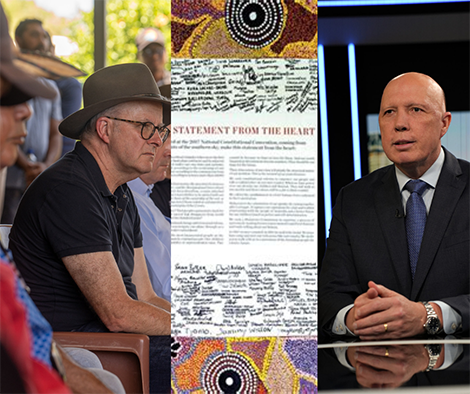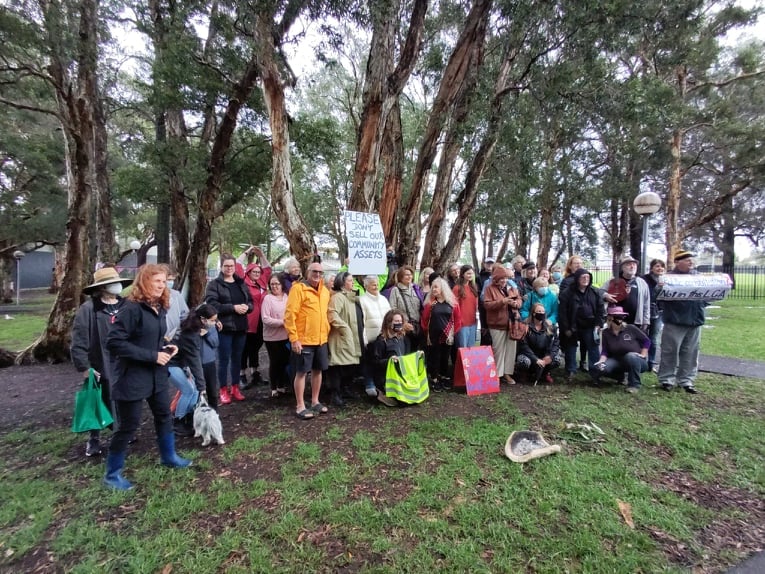Federal Opposition Leader Peter Dutton has written to Prime Minister Anthony Albanese calling for the government to release more information about the proposed Indigenous Voice to Parliament before holding a referendum on this critical human rights and reconciliation issue, but the PM says the public already has access to plenty of information to make the right choice in the referendum.

By Jackie Pearson
GetUp! and a host of other progressive commentators and groups have been blunt in their assessment of the Coalition Leader’s letter to Prime Minister Anthony Albanese about the Voice to Parliament referendum.
“Time and time again, Dutton employs careful language that veils his …attitudes and feigns ignorance – just like he did in this week’s letter, where he claimed he lacked the detail to support giving First Nations People a real say in the decisions that impact their lives,” GetUp claims in its latest fundraiser email.
“This is despite his own Liberal colleagues handing him a 272-page report in 2021 – written by Kungarakan and Iwaidja Professor Tom Calma and Yiman and Bidjara Professor Marcia Langton – detailing how a First Nations Voice could be designed and implemented.”
Crikey’s legal correspondent Michael Bradley summed it up thus: “Pure of motivation, Dutton is focused on ‘tangible improvements to the lives of Indigenous Australians’, notwithstanding that on every measure the decade-long government, of which he was a senior member, failed to deliver any improvement whatsoever.
“Helpfully, Dutton has provided a list of the details the Australian people need before they can consider the Voice proposal. It is at that point he reveals himself fully, and we can safely predict what happens from here.
“Dutton makes Tony Abbott look subtle, so it isn’t difficult to pick up what he’s doing, or whose idea he’s copying. The play is an attempted repeat of John Howard’s successful three-card trick that brought down the 1999 republic referendum: 1) demand the detail; 2) when it’s provided, demand more detail; 3) claim there’s now too much detail and advocate a No’ vote on the basis that, if you don’t understand it, you’re being conned.”
If Peter Dutton believes that there is ‘no such thing as bad publicity’ then the letter has given him wall-to-wall headlines for at least 48 hours. Most of the coverage, however, with the obvious exception of the Murdoch ‘press’, has been rather unflattering.
The transcript of Dutton’s media doorstop at Noosa Head of January 8 gives an indicator of how journalists have taken to this “silly season” letter-writing stunt.
“I’ve written to the Prime Minister on behalf of millions of Australians, just asking for the basic detail about what the Prime Minister is proposing with the Voice,” Dutton announces, having already “dropped” the letter to the media.
“Every Australian wants to see better outcomes for Indigenous Australians, particularly Indigenous kids…
“It’s obvious that the Prime Minister has made a political decision based on the advice of his strategists not to provide the detail to the Australian public, and by doing that, I really think he’s treating people like mugs.
“I think the Australian public deserve to know the detail, and when the Prime Minister says that there’s a report out there from the Marcia Langton-Tom Calma inquiry, he hasn’t adopted that report. There are different options available in the report, but the Prime Minister hasn’t said that he adopts that report or that that’s what would be implemented.
“I think reasonably the Prime Minister can put forward what it is that he’s talking about, because to change the Constitution, as we’ve known since the time the Constitution was written; it’s a very serious question that is being posed and people won’t lightly change the Constitution even if they believe in the cause, unless there is a compelling argument to do so.
“So, by starving the Australian people of the basic detail about the Voice, the Prime Minister is really setting the Voice up for a fail and setting back reconciliation and that’s something that he has to answer to the Australian public on.
“So, I’ve been very reasonable and I’ve been constructive in my approach since the day I was elected as leader. We’ve supported the government on issues where it’s in our national interest to do so, but it’s clear that the Prime Minister has made a political decision to hold back the detail on the Voice and he should release that detail, so that Australians can make an informed decision.”
The first doorstop question asked Dutton if he would consider supporting a ‘Yes’ vote if the government released the information he requested. The Opposition Leader’s response verifies the core contentions argued by Bradley in the Crikey piece: “Well, let’s see what the Prime Minister has to say, because it’s clear at the moment that on the advice of some very clever political strategists, he’s going to rush the constitutional question. It wasn’t proposed for the back end of this year, it was proposed originally for 2024 and he’s made a conscious decision not to release the details. So the Prime Minister has to answer the question, frankly.”
Next question: “Ken Wyatt says he took the 272-page report on the Voice to Coalition ministers. It was agreed to before the election. He was saying that he believes that ministers just simply haven’t read that report, otherwise, perhaps that would be something in that report you’d be prepared to support. What’s changed since then?”
Dutton tells the doorstop crowd he has the utmost respect for Wyatt and other Indigenous leaders but, there’s a but.
“…it’s a good report – but it has not been adopted by the government because there are options in the report. So when we say what would be the composition of the Voice? How would it work on a regional basis? And the most acute issues for Indigenous Australians are in remote areas.”
Next question, if the Langton-Calma report did become the reference document or a particular option in the report, would the Opposition support the ‘yes’ vote.
Dutton basically repeats his previous answers and remains non-committal about what it would take to offer bipartisan support for a ‘yes’ vote on a referendum to amend the constitution to give the First Nations people of this continent a Voice in its parliament.
“It’s a very serious decision to change our Constitution. We live in one of the strongest democracies in the world. We have an established and stable system of government, and this is a very significant proposal to deviate from the way that we govern, the way that the High Court could interpret a Voice and words in the Constitution, and the onus is on the Prime Minister to release that detail.”
And the final question on the matter – is the letter an indication the Opposition won’t support a Voice, to which Mr Dutton replied: “It’s confirmation that we want the detail, and I think millions of Australians want the detail and it is not unreasonable to ask the Prime Minister for the detail…
Prime Minister Albanese responded to the letter via an interview with David Speers on ABC TV’s 7:30.
“This is a bottom-up process” the PM said. “Remember that this began in 2012, there were five years in the lead-up to the Uluru Statement from the Heart being developed.
“Overwhelmingly endorsed by Aboriginal and Torres Strait Islander people after consultations and literally hundreds and hundreds of meetings right around the country.
“Then you had a Joint Select Committee Report to the Parliament in 2018. It was jointly chaired by Pat Dodson and Julian Leeser, who is now the Shadow Minister for Aboriginal Affairs as well as Shadow Attorney-General, about how a Voice to Parliament might operate.
“And then the Coalition Government established a process co-chaired by Tom Calmer and Marcia Langton that produced a more than 260-page report that Ken Wyatt took to the Cabinet not once, but twice.
“So there’s an enormous amount of detail out there. What I intend to do is work with people of goodwill…
“There are a range of things that are completely agreed upon. One is that a Voice should look at matters that affect Aboriginal and Torres Strait Islander people, how we close the gap in health, and education, and housing, how we make a difference there. The second thing that is in the draft wording of the proposals I have put forward at the Garma Festival… is that the Voice will be subservient to the Parliament, that is Parliament will continue to control the destiny of Australia…
“There isn’t actually even a recognition of the position of Prime Minister in the Constitution at the moment. So it is a simple proposition, that we recognise Aboriginal and Torres Strait Islander people in our Constitution, and that they have a voice, that they be consulted. I regard it as good manners. But it is also very clear that the reason why some of the debate is disingenuous at the moment about detail is that it misses the whole point.
“For 120 years since we federated we’ve had the Australian Government do things for Aboriginal and Torres Strait Islander people, often with the best of intentions. What this idea is pretty simple, that we will do it with Aboriginal and Torres Strait Islander people.
“This isn’t my proposal. This is the people’s proposal. I said very consciously in that Garma speech I didn’t say, ‘This is the words. Here is the Government’s position’. I said, ‘Here is the draft words. If you have a better idea, then I’m certainly open to ways in which, if people think that improvements can be made then by all means, come forward with them’.
Albanese confirmed that he had set up a working group and an engagement group yo do a “work through about how the Voice could operate, but doing it being informed by the work that has already been done… People can log on now and look at the report of Tom Calma and Marcia Langton and they can look at the interim report that the committee, co-chaired by Julian Leeser who is now responsible for Indigenous Affairs in the Coalition.”
In response to Speers’ question, reiterating Dutton’s core argument, that the government had not adopted the Langton-Calma report or any of its particular options, the Prime Minister replied: “We want this to be an inclusive process, and people can either look for a way in which this can be given support, or they can look for reasons to disagree and look for division.
“I want to look for national unity. I have made that very clear and that’s why I’ve met with Peter Dutton on a number of occasions, and that’s why I was disappointed to pick up the paper and read that apparently he had written to me but he forgot to actually write to me. He just gave it to the newspapers, which is the first time that I heard about this correspondence. And to me, that isn’t fair dinkum. If you’re fair dinkum, sit down, work the issues through, come up with a constructive proposal.”
On 28 April 1967 a majority of people in a majority of Australian states and territories, 90.77 percent in fact, voted in favour of enabling “the Commonwealth to enact laws for Aboriginal people. To remove the prohibition against counting Aboriginal people in population counts in the Commonwealth or a State.”
Educate yourself before making a decision on the Voice to Parliament. Read the Uluru Statement from the Heart.
Find out as much as you can about why the Uluru Statement called for a Voice, along with truth telling and treaty.
Contact First Nations organisations in your area. Find out who the Traditional Custodians are and what they want a Voice to Parliament to achieve.
Examine the language and behaviour of our leaders carefully. Think about why they are posturing in particular ways on this matter. Vote with your conscience.


